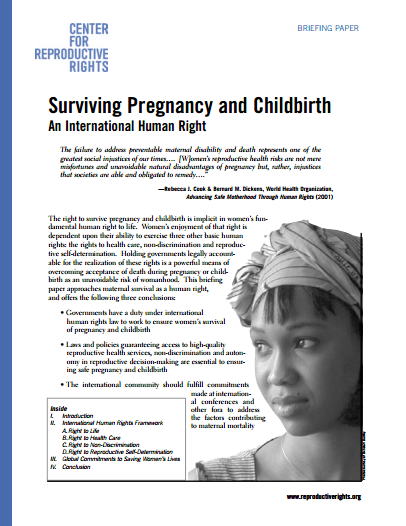Women Suffer Decades of Abuse in Kenya’s Health Facilities, According to New Fact-Finding Report
For decades, women seeking maternity services in health facilities across Kenya have suffered serious human rights violations — including verbal attacks, sexual assault, flagrant neglect and filthy conditions — often while giving birth, according to a new fact-finding report published by the Center for Reproductive Rights and the Federation of Women Lawyers — Kenya (FIDA Kenya).
Failure to Deliver: Violations of Women’s Human Rights in Kenyan Health Facilities documents over 120 women’s experiences and the observations of healthcare providers and administrators, leaders of medical associations and officials at licensing and regulatory bodies between November 2006 and May 2007. The report concludes that women’s negative experiences in Kenya’s health facilities not only have lasting public health implications for the country, but constitute severe violations of human rights that are protected under Kenyan, regional, and international laws. (The executive summary and report can be found at //www.reproductiverights.org/ww_afr_kenya.html).
“Our fact-finding vividly illustrates that Kenyan women have for decades been subjected to degrading and sometimes even life-threatening treatment when seeking out maternity care and services,” said Jane Onyango, Executive Director of FIDA Kenya.
“While this report is specific to Kenya, the problems documented are not. Increasingly, such reproductive rights abuses around the world are being recognized as human rights violations that governments cannot ignore and must address,” said Nancy Northup, president of the Center for Reproductive Rights.
In interviews, focus group discussions, and questionnaires, women describe egregious violations of dignity, mutilation, unhygienic conditions, humiliating treatment, lack of medical attention:
- Josephine, who recently gave birth at a mission hospital was verbally and physically abused by the man delivering her child, who then mutilated her clitoris and part of her labia.
- Jackline suspects that she contracted HIV during her 2002 delivery in a district hospital: “[I]n the labour ward we were three women and there was only one nurse who was attending to us. She was not nice. She treated us badly. It was my firstborn. She came and abused me and slapped me as I was screaming. The other women were also being abused. . . . The first woman gave birth — she was helped — and within three minutes my baby came and the nurse used the same scissors she had used on the other woman. I can’t forget. . . . There was no water there. There is always a complaint about water. She took my baby and wrapped my baby in my lesso [wrapper]. She asked me if I had cotton [and told me where to put it]. . . . I was just alone from 3:00 when I gave birth, to 7:00, [when] the woman next to me noticed I was bleeding. I couldn’t sit. I was squatting on the bed. There was blood all over. . . . I was not checked. The woman got water for me and I bathed. I didn’t have anything to wear or sleep on.”
- Jane recalled the neglect she experienced during the delivery of her first child: “I remember I was a kid and when I was asked to push I didn’t know what to push. I pushed till I went for a long call [had a bowel movement]. The nurses left me and told me it’s my problem.”
- Prudence, who is a casual worker in a maternity ward at a district hospital in Kisumu, said that she consistently observes nurses being abusive towards woman during delivery. “When you go to give birth, they always shout, ‘Did I send you here? Spread your legs the way you did when you got pregnant. That day you did not scream, but today you are screaming at us.'”
,
Shortages of funding, medical staff, and equipment plague the healthcare system, particularly the public sector, and dramatically interfere with the ability of healthcare staff to provide adequate care. While the report notes the positive steps the Kenyan government has taken to promote safe motherhood and reduce death and injury related to pregnancy and childbirth, FIDA Kenya and the Center for Reproductive Rights make several recommendations to the government to address the longstanding systematic and widespread problems that impair the quality of care, including:
,
- Promote and develop policies and legislation that protect the rights of women seeking reproductive health care and make sure that there is sufficient oversight and regulation in both public and private facilities.
- Ensure that the supplies and equipment necessary to maintain hygienic conditions are available and that hygiene standards are strictly enforced and provide adequate equipment for women in labour and newborn infants, including incubators.
- Issue standards and guidelines for medical facilities on patients’ rights and complaint mechanisms, ensure their widespread dissemination and implementation.
- Remove financial barriers that result in the denial of or delays in receiving necessary health care services.
For more information or to arrange interviews, please contact Elisa Slattery, Africa Program Legal Adviser, Center for Reproductive Rights at [email protected] or at +1-917-637-3685.

